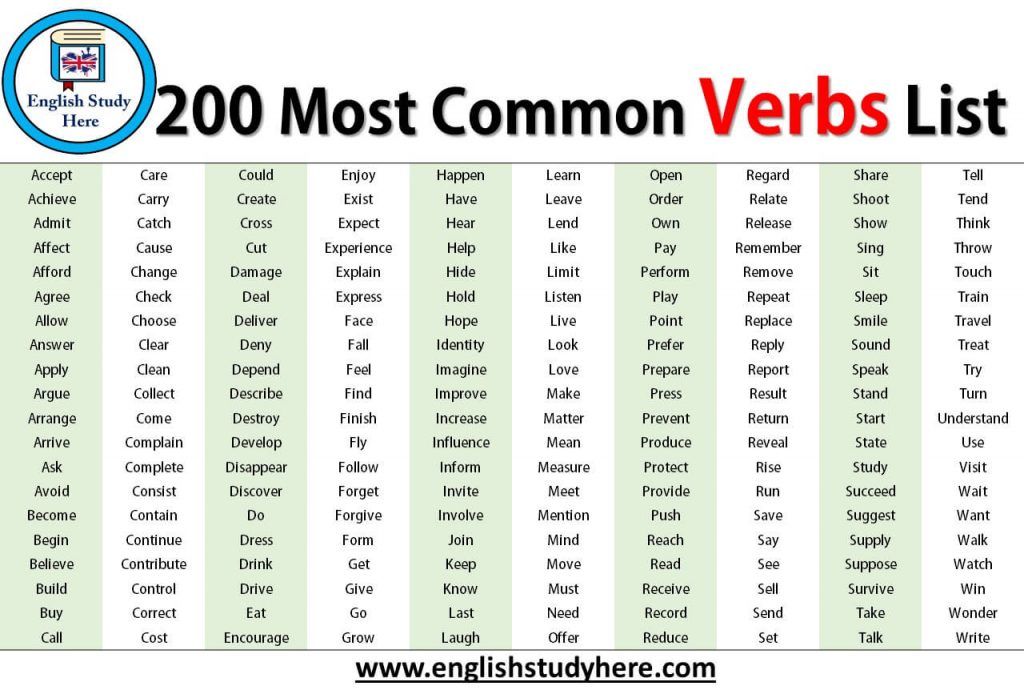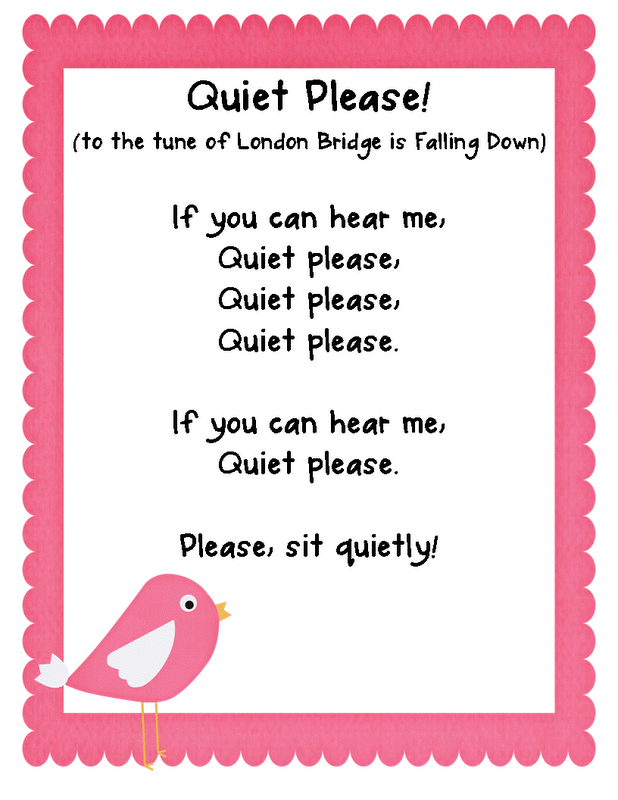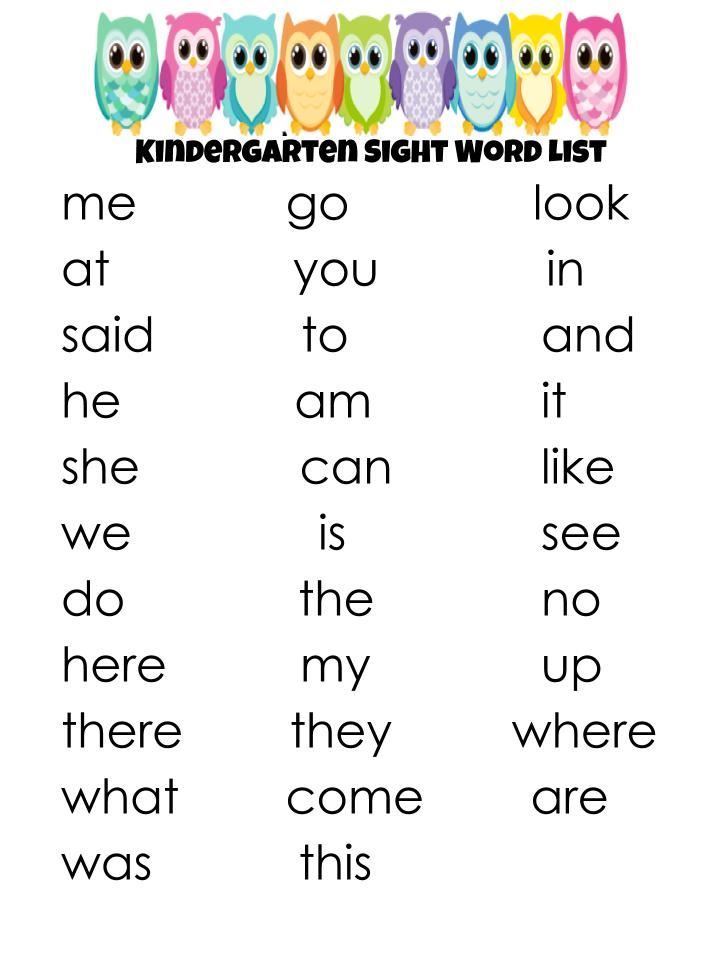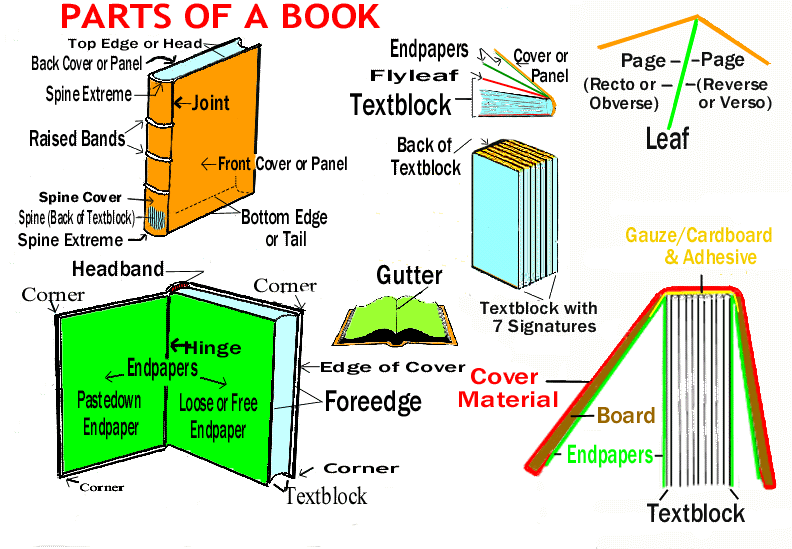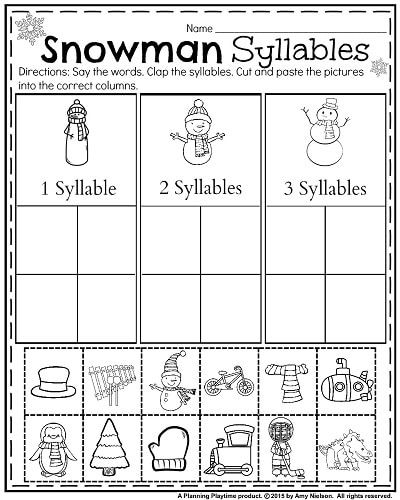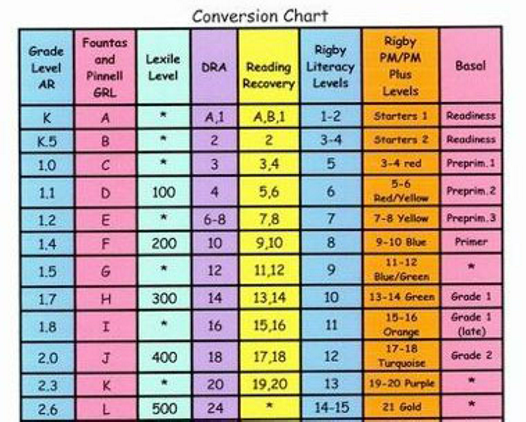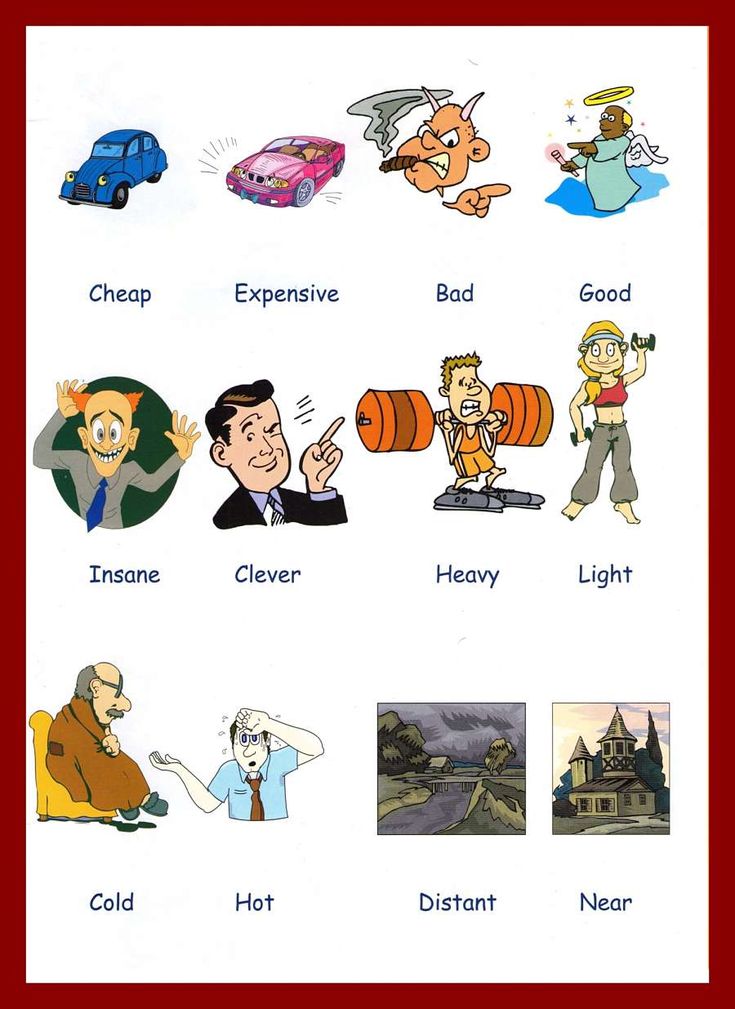Basic verbs list
100 Most Common English Verbs List
This is a list of the 100 most common verbs in English. If you are learning English it would be useful to learn these popular verbs first. Click though to see full conjugation tables of each verb.
Irregular verb forms are in red
Remove ads
| No. | Verb | Simple Past | Past Participle | |
|---|---|---|---|---|
| 1 | to be | were | been | Conjugate |
| 2 | to have | had | had | Conjugate |
| 3 | to do | did | done | Conjugate |
| 4 | to say | said | said | Conjugate |
| 5 | to go | went | gone | Conjugate |
| 6 | to get | got | got / gotten | Conjugate |
| 7 | to make | made | made | Conjugate |
| 8 | to know | knew | known | Conjugate |
| 9 | to think | thought | thought | Conjugate |
| 10 | to take | took | taken | Conjugate |
| 11 | to see | saw | seen | Conjugate |
| 12 | to come | came | come | Conjugate |
| 13 | to want | wanted | wanted | Conjugate |
| 14 | to look | looked | looked | Conjugate |
| 15 | to use | used | used | Conjugate |
| 16 | to find | found | found | Conjugate |
| 17 | to give | gave | given | Conjugate |
| 18 | to tell | told | told | Conjugate |
| 19 | to work | worked | worked | Conjugate |
| 20 | to call | called | called | Conjugate |
| 21 | to try | tried | tried | Conjugate |
| 22 | to ask | asked | asked | Conjugate |
| 23 | to need | needed | needed | Conjugate |
| 24 | to feel | felt | felt | Conjugate |
| 25 | to become | became | become | Conjugate |
Popular
- The top irregular verbs you need to know
- 100 Most common English verbs
- Most common nouns
- Vocabulary lists & games
We notice you're using an ad blocker.
Linguasorb is free and ad supported, without ad revenue we can't exist. Certain features such as audio, directly cost us money and so are disabled for ad block users.
Please disable your ad blocker for this site if you wish to use the premium features.
Alternatively you can become a supporter and remove the ads completely.
To Make Conjugation - All English Verb Forms
- Home
- English
- Verbs
- To Make Conjugation
Infinitive: to make
Gerund: making
Past participle: made
Simple past: made
Irregular forms
Auxilliary verb
Spelling change
Use contractions
Indicative
Present
| I make I make |
| you make you make |
| he/she/it makes he/she/it makes |
| we make we make |
| they make they make |
| you make you make |
| I do not make I don't make |
| you do not make you don't make |
| he/she/it does not make he/she/it doesn't make |
| we do not make we don't make |
| they do not make they don't make |
| you do not make you don't make |
Preterite
| I made I made |
| you made you made |
| he/she/it made he/she/it made |
| we made we made |
| they made they made |
| you made you made |
| I did not make I didn't make |
| you did not make you didn't make |
| he/she/it did not make he/she/it didn't make |
| we did not make we didn't make |
| they did not make they didn't make |
| you did not make you didn't make |
Future
| I will make I'll make |
| you will make you'll make |
| he/she/it will make he/she/it'll make |
| we will make we'll make |
| they will make they'll make |
| you will make you'll make |
| I will not make I won't make |
| you will not make you won't make |
| he/she/it will not make he/she/it won't make |
| we will not make we won't make |
| they will not make they won't make |
| you will not make you won't make |
Perfect
Present
| I have made I've made |
| you have made you've made |
| he/she/it has made he/she/it's made |
| we have made we've made |
| they have made they've made |
| you have made you've made |
| I have not made I haven't made |
| you have not made you haven't made |
| he/she/it has not made he/she/it hasn't made |
| we have not made we haven't made |
| they have not made they haven't made |
| you have not made you haven't made |
Past
| I had made I'd made |
| you had made you'd made |
| he/she/it had made he/she/it'd made |
| we had made we'd made |
| they had made they'd made |
| you had made you'd made |
| I had not made I hadn't made |
| you had not made you hadn't made |
| he/she/it had not made he/she/it hadn't made |
| we had not made we hadn't made |
| they had not made they hadn't made |
| you had not made you hadn't made |
Future
| I will have made I'll have made |
| you will have made you'll have made |
| he/she/it will have made he/she/it'll have made |
| we will have made we'll have made |
| they will have made they'll have made |
| you will have made you'll have made |
| I will not have made I won't have made |
| you will not have made you won't have made |
| he/she/it will not have made he/she/it won't have made |
| we will not have made we won't have made |
| they will not have made they won't have made |
| you will not have made you won't have made |
Continuous
Present
| I am making I'm making |
| you are making you're making |
| he/she/it is making he/she/it's making |
| we are making we're making |
| they are making they're making |
| you are making you're making |
| I am not making I'm not making |
| you are not making you aren't making |
| he/she/it is not making he/she/it isn't making |
| we are not making we aren't making |
| they are not making they aren't making |
| you are not making you aren't making |
Past
| I was making I was making |
| you were making you were making |
| he/she/it was making he/she/it was making |
| we were making we were making |
| they were making they were making |
| you were making you were making |
| I was not making I wasn't making |
| you were not making you weren't making |
| he/she/it was not making he/she/it wasn't making |
| we were not making we weren't making |
| they were not making they weren't making |
| you were not making you weren't making |
Future
| I will be making I'll be making |
| you will be making you'll be making |
| he/she/it will be making he/she/it'll be making |
| we will be making we'll be making |
| they will be making they'll be making |
| you will be making you'll be making |
| I will not be making I won't be making |
| you will not be making you won't be making |
| he/she/it will not be making he/she/it won't be making |
| we will not be making we won't be making |
| they will not be making they won't be making |
| you will not be making you won't be making |
Continuous Perfect
Present
| I have been making I've been making |
| you have been making you've been making |
| he/she/it has been making he/she/it's been making |
| we have been making we've been making |
| they have been making they've been making |
| you have been making you've been making |
| I have not been making I haven't been making |
| you have not been making you haven't been making |
| he/she/it has not been making he/she/it hasn't been making |
| we have not been making we haven't been making |
| they have not been making they haven't been making |
| you have not been making you haven't been making |
Past
| I had been making I'd been making |
| you had been making you'd been making |
| he/she/it had been making he/she/it'd been making |
| we had been making we'd been making |
| they had been making they'd been making |
| you had been making you'd been making |
| I had not been making I hadn't been making |
| you had not been making you hadn't been making |
| he/she/it had not been making he/she/it hadn't been making |
| we had not been making we hadn't been making |
| they had not been making they hadn't been making |
| you had not been making you hadn't been making |
Future
| I will have been making I'll have been making |
| you will have been making you'll have been making |
| he/she/it will have been making he/she/it'll have been making |
| we will have been making we'll have been making |
| they will have been making they'll have been making |
| you will have been making you'll have been making |
| I will not have been making I won't have been making |
| you will not have been making you won't have been making |
| he/she/it will not have been making he/she/it won't have been making |
| we will not have been making we won't have been making |
| they will not have been making they won't have been making |
| you will not have been making you won't have been making |
Conditional
Present
| I would make I would make |
| you would make you would make |
| he/she/it would make he/she/it would make |
| we would make we would make |
| they would make they would make |
| you would make you would make |
| I would not make I wouldn't make |
| you would not make you wouldn't make |
| he/she/it would not make he/she/it wouldn't make |
| we would not make we wouldn't make |
| they would not make they wouldn't make |
| you would not make you wouldn't make |
Perfect
| I would have made I would've made |
| you would have made you would've made |
| he/she/it would have made he/she/it would've made |
| we would have made we would've made |
| they would have made they would've made |
| you would have made you would've made |
| I would not have made I wouldn't have made |
| you would not have made you wouldn't have made |
| he/she/it would not have made he/she/it wouldn't have made |
| we would not have made we wouldn't have made |
| they would not have made they wouldn't have made |
| you would not have made you wouldn't have made |
Imperative
| (you) make (you) make |
| (we) let's make (we) let's make |
| (you) make (you) make |
| (you) do not make (you) don't make |
| (we) let's not make (we) let's not make |
| (you) do not make (you) don't make |
Remove ads
Remove ads
Popular
- The top irregular verbs you need to know
- 100 Most common English verbs
- Most common nouns
- Vocabulary lists & games
55 English verbs you need to know to "survive"
This collection will be extremely useful for everyone who starts learning English on their own, and for those whose level of knowledge of the language is somewhere at the initial step.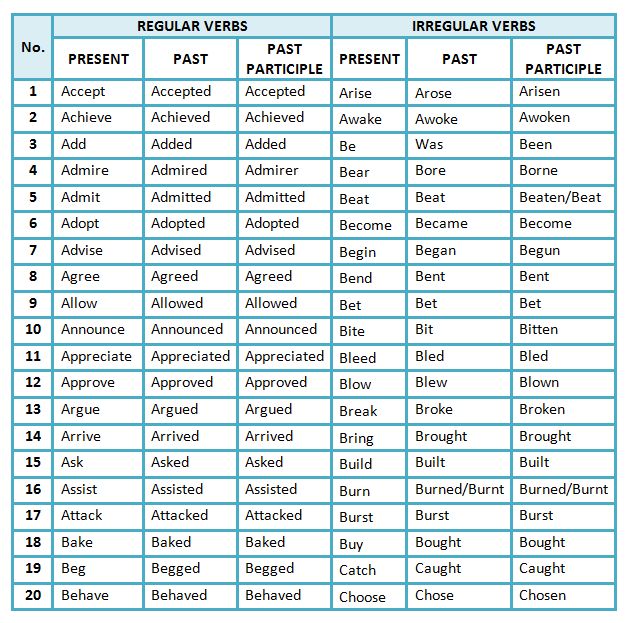 I tried to choose the most necessary English verbs. Of course, this list can and should be expanded, but that's a completely different story. Everything has its time.
I tried to choose the most necessary English verbs. Of course, this list can and should be expanded, but that's a completely different story. Everything has its time.
My task was to prepare for you a list of English verbs for "survival" - ie. to help you understand basic English.
If you are just starting to learn English, this list will be more than ever helpful. All verbs are given in their initial form - the infinitive. Many verbs have more than one meaning, so I give only the very first one, you can look up the rest of the meanings in the dictionary if you are interested.
Fundamental English verbs
- Be – be
- Have - have
- Do - do
- Make - make
- Get - get
- Take - take
- Try - try
- Know - know
- Think - think
- Feel - feel
- See
- Give - give
- Bring - bring
- Buy - buy
- Cost - cost (about the price)
- Break - destroy
- Put
- Eat - eat (eat)
- Sleep - sleep
- Drink - drink
- Understand
- Write - write
- Read
- Speak
- Tell - tell
- Meet - meet
- Teach - teach
- Learn
- Send – send
Article in the topic:
How to say "I like" or "I don't like" in English in different ways
- Forget - forget
- Dream - dream
- Pay - pay
- Sell - sell
- Call - call
- Play – Play
- Drive - drive a car
- Travel - travel
- Start - start
- Stop - stop
- Need
- Use - use
- Can - to be able (to be able)
- Clean - clean
- Help - help
- Run - run
- Cook - cook food
- Open - open
- Close
- Move – move
- Sing - sing
- Swim - swim
- Dance - dance
- Work - work
Having learned these English verbs and set phrases, you will be able to understand everyday English in an elementary way, that is, you will need these basic knowledge at first. Further it is worth deepening knowledge and learning more English verbs.
Further it is worth deepening knowledge and learning more English verbs.
Article in the topic:
How to learn to write in a foreign language and learn the alphabet on your own: useful tips
Necessary stable phrases
There are times when self-study of a language comes to a standstill, you simply cannot force yourself to sit down and open a book, or some material remains incomprehensible.
In this case, I advise you to contact tutors who know how to help you learn a new language, give you the right direction, explain complex material.
Learning never exhausted the mind.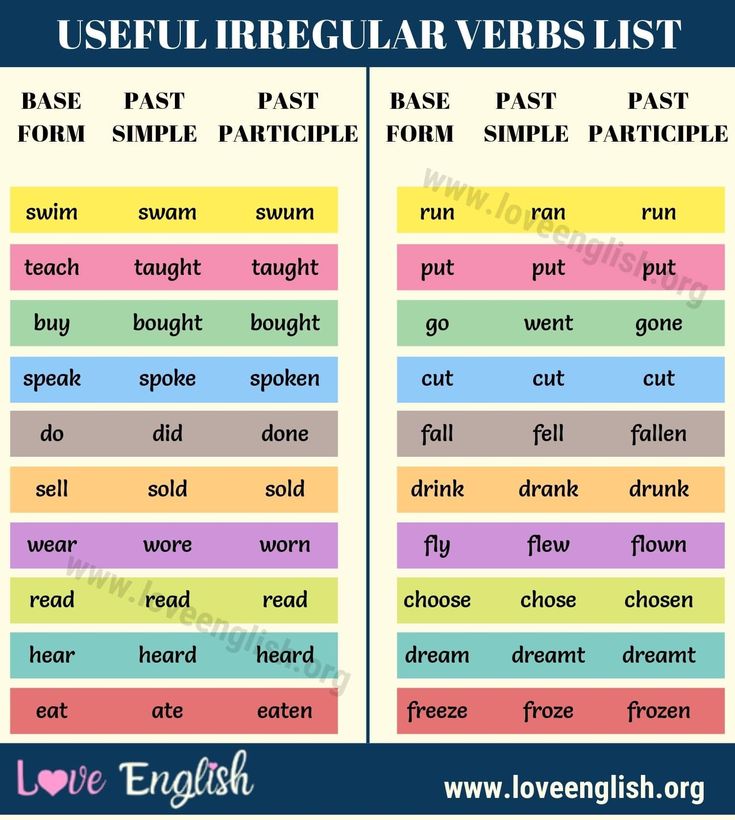
Leonardo Da Vinci
By the way, if you have a question about English, feel free to write to me and I will be happy to give you an answer.
Good luck!
150 most common English verbs + voice acting
04/16/2016
Practical exercises 638.4K
Recently we talked about what exactly is worth remembering at the initial stage of learning a language. It was about verbs - words that describe what is happening around us, actions, plans and intentions. It is around the verb that the rest of the sentence is built.
Read more about how and why to start learning a language with verbs, as well as some basic examples in different languages, in this article.
Today I offer you a list of the 150 most commonly used English verbs. I compiled it based on my materials for learning English, as well as selections from official sources - dictionaries: Oxford Dictionary, Macmillan Dictionary.
In the tablet I give the verb itself in English, translation into Russian, the form of the verb in the past simple tense ( Past Simple ) and the past participle ( Past Participle ), voiced by a native speaker.